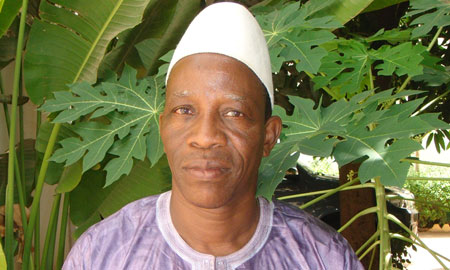The Health Policy Project ended in 2016. Work continued under Health Policy Plus (HP+) until 2022.
NEWS & VIEWS
Traditional communicator adopts RAPIDWomen model as persuasive advocacy tool to improve health, well-being of women and girls in Mali
Posted August 7, 2012
 |
Photo: By involving women, Mamadou Ben Chérif Diabaté has lived up to the tradition of the griots of old. Together, Mr. Diabaté and women’s associations remain dedicated to prioritizing the health and happiness of women throughout Mali. Photo by Famory Fofana, Health Policy Project—Mali |
People living in his rural district of Kita also revere Mr. Diabaté. Kita is one of the cradles of the griots—storytellers, singers, poets, musicians, and repositories of oral tradition dating back to the 13th century reign of Sundiata Keita, King of Mande. Acting as the king's counselors, the griots were responsible for maintaining order in the kingdom and mediating disputes of any kind. They were also responsible for perpetuating the Kouroukan Fouga—the famous charter initiated by the king, which served as the constitution of the early Malian empire—through songs and stories.
Article 16 of the historical charter states that, “Women, apart from their everyday occupations, should be associated with all management of society,” promoting the inclusion of women in decision-making.” As a descendant of the great Mande griots, Mr. Diabaté has dedicated his life to upholding the storied tradition of his forefathers, leading the way to empower women and advocate for their health and happiness.
In Mali, access to quality healthcare services plays a crucial role in the lives of women. However, only two out of every 10 women make decisions regarding their own health and less than 10 percent of Malian women use any method of family planning. These factors contribute to unintended pregnancies and high fertility, which elevate maternal and child mortality. Many women also face domestic violence, which is largely considered acceptable by society, including by many women.
Although he had mastered his role as mediator of conflicts within families and Malian society, Mr. Diabaté lacked information to influence improvements in women’s health, a goal he sees as part of his calling as a griot. He needed statistical data and evidence on how to reduce maternal and infant mortality.
Earlier this year, Mamadou Ben Chérif Diabaté attended a training workshop on how to use the RAPIDWomen model as an advocacy tool. RAPIDWomen is an interactive software modeling system that illustrates how investing in family planning, reproductive health, girls’ education, gender norms, and maternal health programs can increase the quality of life for women, girls, and families. The presentation outlines the situation of females in the country, analyzes results from the model, and outlines key policy messages and calls for action. As a result, government leaders, health officials, and policymakers are able to make informed decisions on health policies—particularly those that affect women’s health.
After the workshop, Mr. Diabaté and several other trainees agreed to champion the cause of improving the lives of women and continue to use the RAPIDWomen model with other Malian associations. He presented the model’s findings alongside fellow women’s rights advocate, Ms. Bocoum Salimata Ouattara, president of the Association of Secretaries and Administrative Assistants, to nearly 70 attendees from the Government of Mali, nongovernmental organizations, women’s associations, and members of the local media.
With a sharp understanding of the model and the strength of his conviction, Diabaté was able to employ evidence from the RAPIDWomen tool in his traditional communicator’s approach and connect with the participants much like the griots before him and make a convincing case for the importance of investing in women and girls. Participants engaged in heated discussions about how to best reduce violence against women. All agreed on the most important issue—the need to stop it from happening.
Following the presentation, leaders from the Association of Women Physicians, the Association for Women’s Dignity, and the Malian Association of Women Lawyers publicly committed to incorporate the RAPIDWomen model in their efforts to promote the welfare of women and girls in Mali. Mr. Diabaté recommended that the model be translated into local languages ??and called on participants to suggest associations to which the model should be disseminated in order to reach as many people as possible.
By involving women, Mamadou Ben Chérif Diabaté has lived up to the tradition of the griots of old. Together, Mr. Diabaté and these women’s associations remain dedicated to prioritizing the health and happiness of women throughout Mali.
Download printable PDF version
What's New
- Something to Build On: “Innovation Exchange” Celebrates the Health Policy Project’s Close and a New Beginning
- What Will it Take for Tanzania to Achieve ART Targets and Ensure Long-Term Sustainability of the HIV Response?
- Helping Kenya’s County Leaders Advocate for Increased Health Investments
- HPP Holds Working Meeting on Ensuring Responsible PEPFAR Transitions for Key Populations
- Health Policy Project Celebrates 2016 International Women's Day
- HPP Staff Participate in White House Conference on HIV Stigma Reduction

